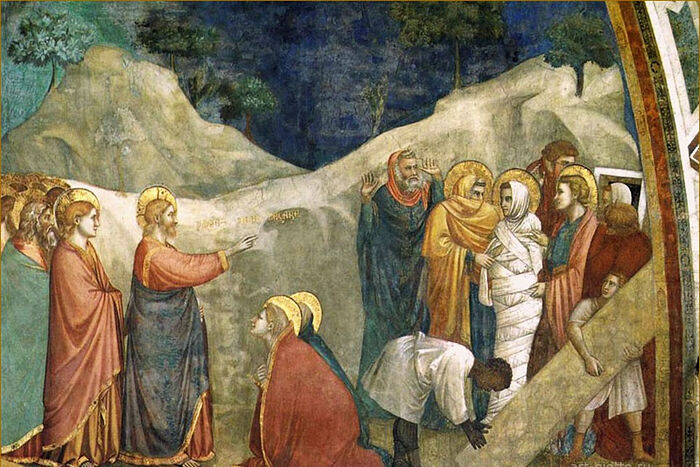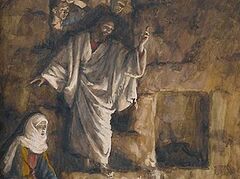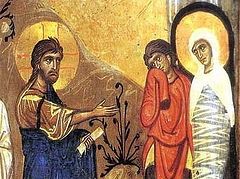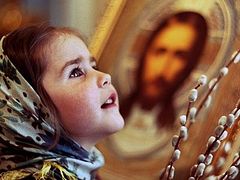 The Raising of Lazarus. Giotto di Bondone. Frescoes of the Lower Church of San Francesco in Assisi. C. 1310. Photo: art-giotto.ru
The Raising of Lazarus. Giotto di Bondone. Frescoes of the Lower Church of San Francesco in Assisi. C. 1310. Photo: art-giotto.ru
God is the Lord and has appeared unto us Blessed is He that comes in the Name of the Lord. This verse is radiantly chanted at all festal Matins services, and it is the motto par excellence of these days which are intimately interconnected: Lazarus Saturday and Palm Sunday. The Holy Gospel teaches us that, six days before the Passover, Christ is mystically informed of the death of His dear friend, Lazarus. He begins a journey up to Jerusalem wherein He will triumphantly enter the Holy City to suffer the Passion, to submit to Crucifixion, and to taste death and burial—but ultimately to Rise from the dead in victory. Desiring to confirm the universal Resurrection, as we hear in the magnificent troparion which is chanted on both these solemn days, Jesus raises Lazarus from the dead before His Passion. In Lazarus’ Resurrection, we—each one of us—witness the ultimate defeat of death even prior to the Savior’s own death. This occurred so that the multitudes not only there, in Bethany, at Lazarus’ tomb, but also throughout history would become witnesses of death’s weakness and folly in the face of the almighty God-Man, Christ, the Master of life and death. And becoming witnesses of the Resurrection before the Resurrection, the multitudes—especially the young innocent children—welcomed Christ the next day as a triumphant and eternal King, whose dominion is from generation to generation; a King who is Lord of Lords, God become Man, the Vanquisher of Death. Hosanna to the Son of David! Blessed is He that comes in the Name of the Lord, Hosanna in the highest! This is the synopsis of this current feast. And after greeting Christ as their King, soon these same people hurried to prepare the Passion. Why this sudden transformation of heart? Why did Israel turn so quickly against the One she herself but days prior proclaimed Her eternal King, the heir to David’s throne?
I am the resurrection and the life. Those who believe in me, even though they die will live. These words uttered to Mary, Lazarus’s sister, in the moments before Lazarus’ Resurrection are the emblem of our Christian faith. Christianity is based on the Resurrection, Christianity exists on the premise that the Savior grants life everlasting, and that a final, universal Resurrection of all will occur. If Christ is not risen, your faith is in vain! This firm belief in the Resurrection was embraced piously by all the righteous of the Old Testament who waited to see my day, the Lord said. Abraham saw my day and was glad, Christ proclaimed. And the Prophet Job the Much-Suffering, though signed with all the symbols of death, illness, abandonment, contempt, and mockery, yet ever having hope in the Coming of the Savior and the granting of pardon and Universal Resurrection to all the dead from time immemorial, confessed, I know that my Redeemer lives, and that in the end He will stand on the earth. And after my skin has been destroyed, yet in my flesh I will see God; I myself will see Him with my own eyes—I, and not another. How my heart yearns within me!...
With these sublime sentiments in mind, we hear the Savior’s voice: Lazarus, come forth! Having lamented the misfortune of our nature, the sentence of death by which we are bound, the Savior with these three words destroyed and annihilated it. Lazarus, bound with his burial linens, came forth as a token of the universal Resurrection. Thankful, the sisters Mary and Martha bowed before the Savior and Redeemer foretold by the Prophet Job in those ancient days. And the Prophets and Old Testament righteous were glad when Lazarus’ spirit left their domain. Mary and Martha that evening prepared a meal. Lazarus too was there. Oh, what envy the Jews displayed as they came to examine Lazarus! Christ’s coming, Christ’s entrance, and death’s defeat meant terrible tidings for those who ran the religious show of the day! Being in communion with death, they despised life, and became enemies of the mercy and peace sent to them by God. They witnessed a resurrection from corruption, and did not fathom that this same resurrection unto life would likewise be given to them—if only they would approach Christ in all sincere devotion and faith.
Now, we must make clear a certain distinction: The Lord’s Resurrection which we celebrate in one week—Holy Pascha—will be incorruptible in the sense that Christ was not subject to corruption. Yet, Lazarus’ Resurrection is from corruption: Lazarus was decaying in the tomb already four days. The stench was unbearable. How like Lazarus’ resurrection is to our own! How we see Lazarus in ourselves! Each one will hear, at the end of history’s days, the triumphant voice of Christ—and those that hear His voice shall live. Some will follow Him to a Resurrection of life, and others—those who have not even a slight inclination toward salvation, will perish unto a Resurrection of judgement. Lord, spare us such a ghastly fate! Mary and Martha hear of their brother’s potential Resurrection and protest: But he is four days dead! They had the utmost faith in Christ, yet neither their minds nor the eyes of the heart could fathom the Resurrection of a man dead for so long. The resurrections they had read about in scripture, for example, wrought by Elias and Elisha concern those dead for one day at the most. The Savior had previously raised a girl and the son of the widow of Nain from the dead, but both of these had been dead for perhaps some hours. The Savior’s omnipotence is manifest in the Resurrection of Lazarus. Death, at any point, caves to the Savior’s voice. How we must pray for death to cave within us now, in this moment, when we hear the Savior’s words! The Resurrection should become our life now. The Church is always in God’s eternal present, the Church always lives the Resurrection. This is why the hymns are written in the present tense: Christ IS Risen; Hosanna—Blessed IS He that comes...
He is coming, yet in what condition will we receive Him? Is my life evidence of the Resurrection? These are the pivotal questions each must ask himself or herself. Will we be like the innocent children who one day shouted Hosanna and then prepared the Passion for the Passionless One? We must ask Him to raise us—to raise us from our anger, from our bitterness, from our resentment. We must ask Him to resurrect our fallen soul. To grant us His Life now, in preparation for the death to which we must submit, in order to meet Him face to face at the final Resurrection. In an instant—oh, what an incorruptible change will occur! We will meet our Father, our Brother, and our Friend. Indeed, the Lord called Lazarus His friend, and He wept over Him. According to Metropolitan Anthony (Bloom) we have become Christ’s friends in Holy Baptism wherein we died and arose with Christ. As many as have been baptized into Christ have put on Christ! We sing festally at the Liturgies this weekend, testifying that the Resurrection has begun at our baptism. It is continuing in our life. The Resurrection manifests itself each time we Commune worthily of Christ’s Body and Blood, wherein the Son of David enters our soul, which welcomes Him in Triumph with Hosanna, to the Conqueror of Death. We taste immortality and will, at one point, enter the grave with the Hope that, one day, we will be called, as Lazarus was, to come forth.
In the wake of Lazarus’ rising, Israel was convinced that Christ was the King who would reign eternally from Jerusalem. They greeted Him in worship at the gates of the Holy City as King and Redeemer because He performed this magnificent sign for them: Just the day before He had raised a man four days dead. Hosanna, they cried, as He entered the Holy City in all humility on a lowly donkey. Laying down palms, they welcome Him as a victorious Sovereign returning from battle. Yet Christ is not disillusioned by this reception. He accuses Jerusalem of not comprehending the days of her visitation. This miracle, this token of the Resurrection, did not seriously permeate their hearts and minds! If thou hadst known, even thou, at least in this thy day, the things which belong unto thy peace! But now they are hid from thine eyes! For the days shall come upon thee, that thine enemies shall cast a trench about thee, and compass thee round about, and keep thee in on every side, and shall lay thee even with the ground, and thy children within thee; and they shall not leave in thee one stone upon another; because thou knewest not the time of thy visitation.
The cries of Hosanna are soon transfigured, displaced by other, treacherous cries: Not that one, Barabas! Away with Him, Crucify Him! Crucify Him! And this sequence of events occurs in each soul which defiles the image of Christ within, at first adorning Christ with Hosanna, and then Crucifying Him by a sinful, profligate life. Now as we embark on the journey to the Cross, we must behold our Life hanging on the Wood. We must seriously internalize: Who Christ is for us? Is He our life? Then why do we not live in the light of His Resurrection? Why do we not hasten to die with Him in a life of well-lived service to others, to the least of these? Let us keep silence this week. Let us keep watch. Attending the beautiful Bridegroom services, the Pre-Sanctified Liturgies, and the moving services which will occur from Holy Thursday on, let us listen carefully to the melancholy hymns and our Savior’s voice in the Gospel which will tell us the final parables and warn us of the end. With the eyes of our hearts let us follow Him closely to the Passion and to the Cross. We are in need of watchfulness and sobriety, for the times we live in are truly history in the making, somber days, life altering days, society altering days. Pray therefore, that you be vouchsafed to pass all these trials in order to stand guiltless and uncondemned before the Son of Man.
I wish you a blessed Holy Week, a sanctified beginning of the august Holy Passion of Christ!




